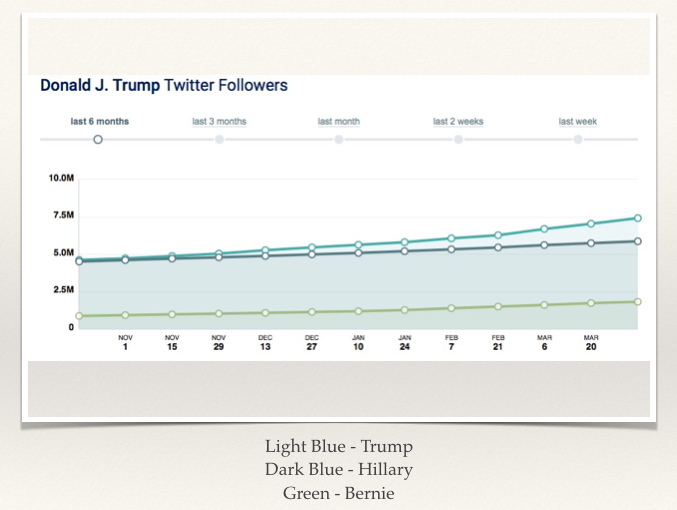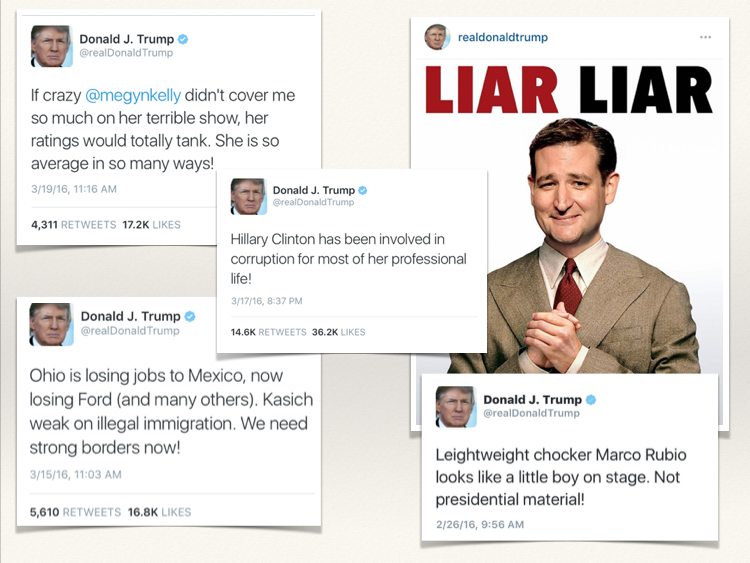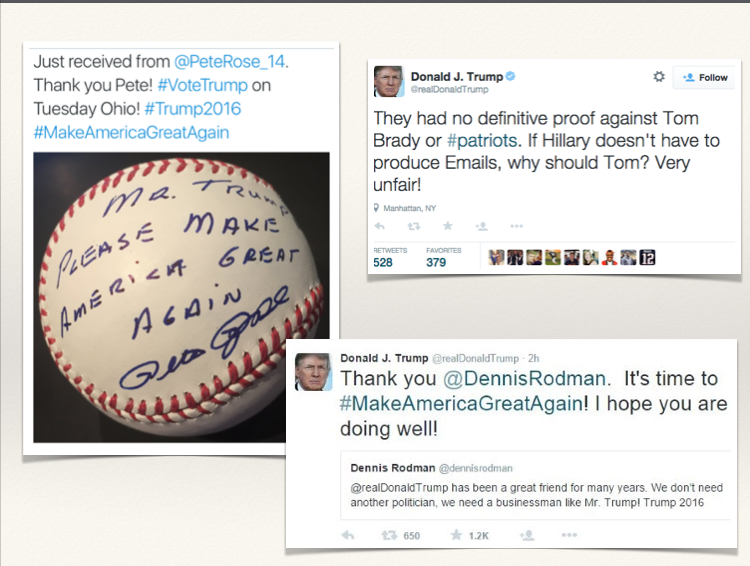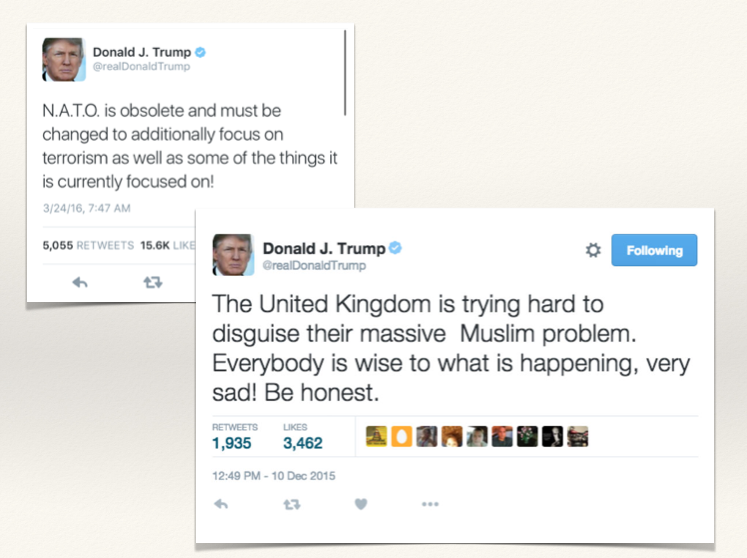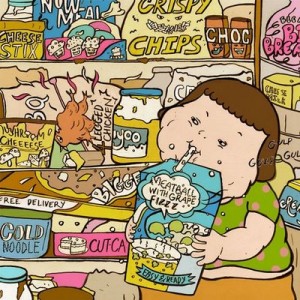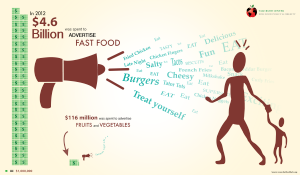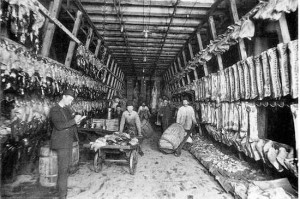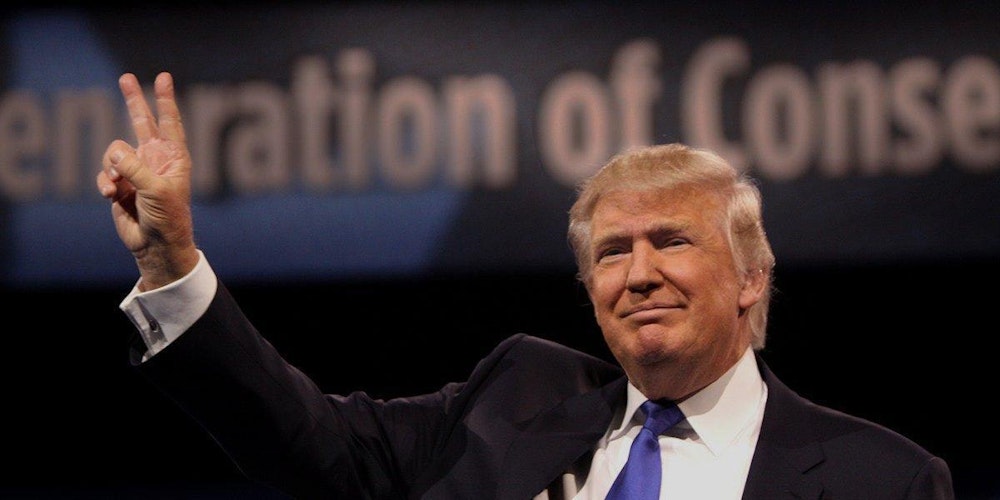
By now, we all know who Donald Trump is. He is a real estate mogul, a reality TV star, and yes, the front runner for the republican party for the president of the United States. Despite Trump’s lack of qualifications, he has been heavily supported throughout his campaign. With over 7 million followers, Trump has been able to use Twitter and other forms of social media to connect and grow his fan base along with using it to attack his opponents. It is no surprise to me that Trump did not nearly make it as far the first time that he ran in 2012. According to the Pew Research Center, only 23% of teens had access to smartphones in 2011. Now, approximately 73% do. Due to the heavy increase in technology and mobile communication, Trump is able to campaign 24/7 and constantly share his views and opinions. It is clear to see the extreme change that is happening in this election. The people that once were taken seriously now look weak and unqualified, and so many people are wondering how this is happening. Social media and mobile communication have created a platform for people to generate brand and image and identity effortlessly. People are able to present information that is representative of themselves and consistently share content that relates to their profile. In the case of Trump, he has used technology to create a powerful image of a strong leader, despite his lack of political experience. His message and the information that he displays about himself, is controversial, yet, attractive to a large population. It is simple and easy to understand, but is deceivingly manipulative. Trump knows just what to say to generate a buzz, and with the pairing of social media, that buzz is able to put him in the spotlight. In the information age, people are able to manipulate data and information in order to create seemingly realistic and believable personality on the internet, yet in reality, we really have no clue about the motives of the person has behind the phone. The ability to control information and data on social media allows manipulative people like Donald Trump, the opportunity and power to create strong brand identity with massive appeal and high rates of conformity.
Trump owes a majority of his political success to social media. CNN questions if Trump is the first ‘social media president‘ comparing him to previous presidents that utilized different means of communication. They referenced FDR being the first radio president, and JFK being the first television president. The way we communicate with each other is such an important aspect of being human, and it has changed immensely. Mobile communication allows us to stay connected at all times and share information with the touch of a button. In terms of running a campaign and gaining supporters, social media has allowed Trump to shape his image the way that he wants to. Through tweets, status updates and other forms of media, Trump is able to convey a powerful message that is specifically tailored to himself and what he wants to represent in his campaign. He is able to promote his image while simultaneously attack his opponents. And as if Trump did not get enough recognition on his own, the media has made it their job to put all efforts in condemning Trumps campaign. The amount of media coverage Trump is getting is record breaking. He is constantly the topic of talk shows and news articles and has taken the spotlight away from professional politicians, and despite what people say about him, his numbers will continue to grow.
It is the networking aspect of social media that is so powerful in regards to a political campaign. His ability to connect with individual people allows him to form ties and to create a social network. The concept of being the center of a network is fascinating, because you are essentially the center of all attention. Everything relates to you. This is why despite the historic amount of negative coverage Donald Trump is getting from newspapers, TV shows and other forms of media, his numbers have only continued to grow. Regardless if its positive or negative coverage, anything that relates to “Trump” is only fueling his fire.

Within the last 6 months, Trump has grown his following by roughly 2.8 million (4.6-7.4) comparatively to Hillary Clintons 1.3m growth (4.5-5.8) and Bernie Sanders’ 1m growth (800k-1.8m) (according to trackanylitics and social bakers). He overall has gained 4.4 million followers since he announced his campaign. Now, many people are wondering why Trump is in the lead and how he is so successful. Well to me it is quite clear. Donald Trump is the king of controversy, and despite what people say or how much the media bashes him, his numbers will continue to grow. And why is this? Because in the media, any publicity is good publicity (for the most part). It is interesting to see the many different sides of the interpretation of information. Trump’s major following on twitter and social media allows him to control the information that he wants to present, and despite what the media says, he will always be able to manipulate the situation to his advantage. For example, recently there was a controversy regarding Trump’s views on abortions, and there are many different angles to the story. With everyone being able to express their opinion about anything, it is hard to find an argument that is 100% true. Social media and the countless perspectives and freedoms it grants has caused our interpretation of information it to be overly critical, and overly sensitive.
Social media not only has allowed to spread his own message, but it also has allowed him to attack, and belittle his opponents. Throughout his campaign, ruthlessly attacked candidates for being a ‘light weights,’ called Obama ‘stupid,’ gave Ted Cruz the nickname ‘Lyin Ted’ Megyan Kelly ‘Crazy Megyan’ and Hillary Clinton ‘Criminal Hillary,’ along with repeatedly calling her out for her emails. He subtly used fear of job loss in the state of Ohio to attack John Kasich. These nicknames and attacks may seem childish, immature, and overall politically incorrect, but it has generated momentum amongst his supporters.
Trump has also used social media to get endorsed by celebrities, athletes and other powerful figureheads. Tom Brady, Pete Rose, and Dennis Rodman have all been publicly displayed to support Trump. However, Pete Roses’ attorney told the Washington post a couple of days later, “we do not know how Mr. Trump got the ball,” and “I can’t speak to how Trump got the ball. Pete didn’t send that.” Like I said before, the information on social media can easily be skewed and manipulated.
It is hard to trust a lot of what is said on the internet, because technology allows us to compose extremely well crafted information that can be tailored to a specific audience of people. Anyone can say anything, and this causes an over sensitivity to content on the internet. Social media has changed the way we do politics. Instead of opinions mainly circulating from newspapers, radio shows and word of mouth, they now have the strongest effect on the web.
Another large tactic in his campaign is to use fear to generate support and solidarity. It is with a common and perspective and belief towards an issue that creates unity. With recent terrorist attacks in Paris, Belgium and Pakistan, many Americans have been overly cautious when it comes to immigration, especially those that come from the middle east. When talking about the issue in regards to other countries Trump stated “We have places in London and other places that are so radicalized that the police are afraid for their own lives.” Later the police service replied by saying that “Mr. Trump could not be more wrong.” Social media has allowed Trump to constantly spread fearful messages and propaganda about immigration and terror. It is with statements like this that display the lack of validity and truth social media provides. And regardless of whether he is politically correct or not, or true for that matter, his tweets always get a lot of attention and support.
There is no doubt that Trump has brought attention to politics. I know I for one started paying attention to it more just from naturally using Twitter. I question if this is the beginning of a political revolution. Is the way we do politics changing forever? Will twitter feuds be the new form of debating? Where everything is recorded and information is easily accessed to the public? Well, as a democracy, the power is said to be in the hands of the people, yet the current political system that we live in is largely dictated by super-pacts and large corporations. The power is intact not in the hands of the people, but in the hands of the money. However, with people being able to freely communicate with one another, people are starting to realize the power that their individual voice has. Clay Shirky, writer for foreign affairs explains that “as the communications landscape gets denser, more complex, and more participatory, the networked population is gaining greater access to information, more opportunities to engage in public speech, and an enhanced ability to undertake collective action. In the political arena, as the protests in Manila demonstrated, these increased freedoms can help loosely coordinated publics demand change.” It gives a voice to those that were once unheard, and that power is incredible.
I find it interesting that so many people despise Donald Trump, when in reality, all he has done has woken up and inspired large portion of the nation. More people are interested in the political race, and more people are taking matters into their own hands. He is single handedly changing the way politics are done. He has shown the power of unity and public voice, and although his views might not be 100% politically correct, has created an enormous following that is frustrated with the current political system. Paradoxically, Trump embodies the freedom and opportunity of the American dream, yet, the people of America are upset that he is going against the establishment. America is the onlyHis campaign is symbolic of the unfiltered freedom that technology brings us, and demonstrates the power of what people can do if they have a lot of money. He has demonstrated how powerful social media can be if you know how to manipulate information correctly. It is a battle between the information age and traditional methods, and that is the biggest controversy of all. •
———————————————————————————-
[1] How well does the title provocatively focus the reader’s attention, as well as the lede? Is it thoughtful, creative, clever? Does it lead the reader into the text and provide some insight into the issue?
I called my article “A Campaign in the Information Age” with intentions on suggesting the differences that we are facing in the 2016 political race due to technology. I think it does a good job of being capturing but not blatant as to what my article is about
[2] How well does the introductory section of the article invite the reader into the paper, as well as offer up exigency? How does it locate a problem or controversy within a context that provides background and rationale?
I think that the intro paragraph of my article does a good job of setting up the scene. I made sure that my claim was supported by the previous information that I just stated.
[3] How well does the writer offer up a strong ‘idea’ that requires analysis to support and evolve it, as well as offers some point about the significance of evidence that would not have been immediately obvious to readers.?
My claim ties together the controversy of both Donald Trump and the effect social media has on our way of communicating. It also acts as a cliffhanger to engage the readers.
[4] How well does the writer show clarity of thought; uniqueness of presentation; evidence of style; and historicized topics?
I made sure that my argument was driven by my primary and secondary sources. I also think that my argument is unique, relevant and does a good job of tying together a controversy that is much greater
[5] How well does the writer recognize that a NYTs Magazine audience will challenge ideas that are overgeneralized or underdeveloped or poorly explained? (that is, did the writer avoid cliché and vagueness or address points/issues readers are likely to have?) How well did the writer decide about how to develop, sequence, and organize material?
I thought that I did a good job of progressing about the different aspects of technology and social media use. I think that these examples help clarify and support my claim and provide context to my argument
[6] How well does the writer research a controversy, develop a persuasive stance, utilize research about the topic, and join the ‘debate’ by making an argument of importance?
I think that my argument is very relevant and everyone can relate too. There is sufficient primary, secondary and scholarly research to back the claim
[7] How well does the writer meet or exceed research expectations of assignment requirements (6 appropriate secondary sources, 1 visual source, (or more) and primary research? ).
I got a lot of great sources including twitter accounts, youtube videos, news reports and scholarly articles.
[8] How well does the writer integrate secondary and primary sources (that support and complicate the topic) effectively into the text, introducing and contextualizing them, and “conversing” (i.e. no drop-quoting) in ways that deepen and complicate the analysis?
I used a lot of primary twitter sources that directly supported my claims, and the secondary sources were used to look at my argument from a different perspective.
[9 How well does the writer persuade an audience to consider claims made from a particular position of authority on which you have built your research? How strong and effective is the writer’s use of rhetorical tools (ethos, logos, pathos)?
I think that my paper did a good job of providing relevant information, but the tone of my argument remained relatively neutral. I wanted to give both sides of the controversy and ultimately give the reader insight and let them make up their own mind.
[10] How well does the writer select appropriate, interesting, revealing visual? Has the writer placed a visual strategically in the essay and provided relevant commentary on and/or analysis of them? Do the visuals contribute to the essay in meaningful ways (i.e. would the essay be affected if the writer took the visual away)?
I provided many visuals to my article. Some of the visuals provided content like tweets and graphs, while others were more complimentary to the article. Some of the visuals are also my primary sources so they help support my argument.
[11] How well does the writer show development of final article using various drafts, in-class peer editing and workshops, and/or teacher comments?
I took a lot of time to re work some of my paragraphs and provide more detail to my claims. The workshops were very helpful, because it provided multiple perspectives to me peice, which helped me refine it.
[12] How well does the writer use hyperlinks—are they effective/appropriate?
I used two hyperlinks in my article. One, linked you to an article that I was referencing, and the other one linked you to a video that supported what I was saying.
[13] How well did the writer edit for grammar, style, and usage effectively? Does the writer’s attention to sentence level issues help him/her establish authority or credibility on the issue?
I thought the structure of my paper was very well put together. I tried to use language that was understandable, yet, was specific to what I was trying to say. I think that my tone and style of the article was effective for getting my message across.
